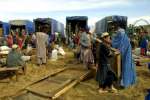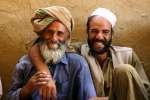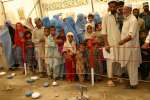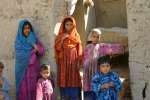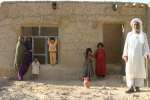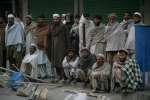Band on a Run: Afghan refugees making some noise in New Delhi
News Stories, 21 October 2010
NEW DELHI, India, October 21 (UNHCR) – A former humanitarian aid worker and journalist in Afghanistan, Khalid has found a new vocation as a band manager in India and a new purpose to his life.
"This is my mission – to work with the boys, create hope for them and to help people find their potential, whether they are in their country or not," Khalid told UNHCR as the Afghan refugee band, Yuva Beats, rehearsed behind him in a Delhi basement.
But just a few months ago, after fleeing his native Kabul and finding shelter in the Indian capital, he was finding it difficult to cope with life as a refugee and fell into a deep depression. "I was completely disillusioned. I thought my life had ended," the 30-year-old revealed.
Managing the band in his spare time has helped restore his confidence and made him realise that even if he cannot return home, he could use his skills to make the best of things in exile. "I could contribute. I gave my ideas as a director and I could spot talent," explained Khalid, who supports his wife and two young children by managing guest houses for their Indian owners.
And judging by the growing interest in Yuva Beats, the seven-member group certainly has talent. One of India's leading private news channels, CNN-IBN, has aired a profile on the versatile band, which plays a mixture of Hindi, English, Farsi and Dari songs. They are also having a go at composing their own music.
Khalid spotted them in a talent contest organized by a youth club that UNHCR and its local partner, Don Bosco Ashayalam, supported. Playing music remains a pastime for the group members, and they give free concerts for refugee youth groups and on World Refugee Day on June 20.
For now, they just want a place to jam and provide some pleasure to other Afghans and supportive Indians. But Khalid hopes to cut a demo tape for a record company and publicise the band. "I want Yuva Beats to become the heartbeat of every refugee around the world."
Wais, who sings and plays acoustic guitar, has composed the band's only original music – love songs in Dari. "Music energizes me. It takes away my tiredness. I compose music to take away my sadness," says the 24-year-old, who has been in New Delhi for three years and lives with his mother and brothers.
Before joining Yuva Beats, he'd done a bit of busking outside southern Delhi shopping centres, where people were surprised to hear an Afghan singing songs in Hindi. "People have told me to make a record, but this is a hobby for me," he said.
Rahmatullah is the lead singer of Yuva Beats. He studied to be an artist in Kabul, but has always had a deep interest in music, which was banned in Afghanistan during the rule of the Taliban from 1996-2001.
In his homeland, Rahmatullah used to sing traditional Afghan songs at weddings in Kabul, as did the drummer, Haider. The band is a very important part of any Afghan wedding, with people dancing to the music.
Now the two have an audience, rather than forming the background music. "I can't explain how I feel when I hold the microphone in my hand and have a hall full of people clapping. I never expected this. Now, people know me as a singer," said a grinning Rahmatullah, who arrived in New Delhi last year with his mother.
And he is now looking for a teacher to teach him about Indian classical music. He hopes to one day take part in the Sa Re Ga Ma Challenge, India's top music talent contest.
Making music is very much a hobby for the band members and their manager and they still need to work to make ends meet. Rahmatullah, for example, sells his sketches in the local markets, and Waiss is an interpreter.
But it's their music that really keeps them going and, with luck, they might one day emulate the success of another band formed in exile: Sierra Leone's Refugee All Stars.
By Nayana Bose in New Delhi, India













